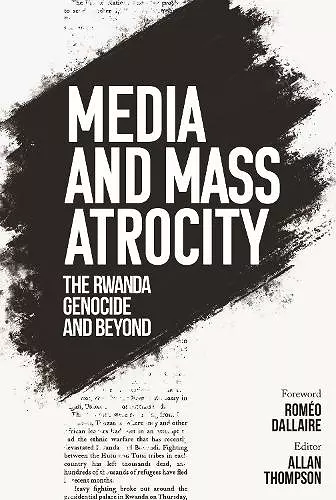Media and Mass Atrocity
The Rwanda Genocide and Beyond
Format:Hardback
Publisher:The Centre for International Governance Innovation
Published:6th Apr '19
Currently unavailable, our supplier has not provided us a restock date

When human beings are at their worst – as they most certainly were in Rwanda during the 1994 genocide – the world needs the institutions of journalism and the media to be at their best. Sadly, in Rwanda, the media fell short. Media and Mass Atrocity revisits the case of Rwanda, but also examines how the nexus between media and mass atrocity has been shaped by the dramatic rise of social media. It has been twenty-five years since Rwanda slid into the abyss. The killings happened in broad daylight, but many of us turned away. A quarter century later, there is still much to learn about the relationship between the media and genocide, an issue laid bare by the Rwanda tragedy. Media and Mass Atrocity revisits the debate over the role of traditional news media in Rwanda, where, confronted by the horrors taking place, international news media, for the most part, turned away, and at times muddled the story when they did pay attention. Hate-media outlets in Rwanda played a role in laying the groundwork for genocide, and then actively encouraged the extermination campaign. The news media not only failed to fully grasp and communicate the genocide, but mostly overlooked the war crimes committed during the genocide and in its aftermath by the Rwandan Patriotic Front. The global media landscape has been transformed since Rwanda. We are now saturated with social media, generated as often as not by non-journalists. Mobile phones are everywhere. And in many quarters, the traditional news media business model continues to recede. Against that backdrop, it is more important than ever to examine the nexus between media and mass atrocity. The book includes an extensive section on the echoes of Rwanda, which looks at the cases of Darfur, the Central African Republic, Myanmar, and South Sudan, while the impact of social media as a new actor is examined through chapters on social media use by the Islamic State and in Syria and in other contexts across the developing world. It also looks at the aftermath of the genocide: the shifting narrative of the genocide itself, the evolving debate over the role and impact of hate media in Rwanda, the challenge of digitizing archival records of the genocide, and the fostering of...
ISBN: 9781928096726
Dimensions: unknown
Weight: unknown
656 pages